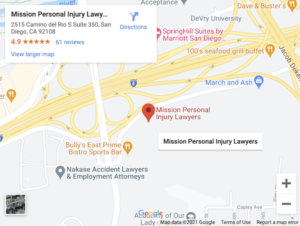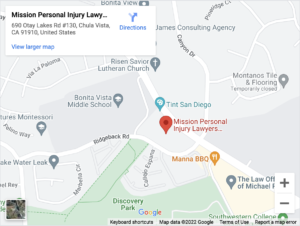
Have you or someone you care about suffered a spinal cord injury? Don’t navigate this alone – our experienced San Diego Spinal Cord Injury Lawyers at Mission Personal Injury Lawyers are here to help. Call us at (619) 777-5555 to arrange a free consultation.
A spinal cord injury can change your life and result in paralysis or death. Even a minor spinal cord injury could leave you with nerve pain, muscle weakness, and loss of coordination. Spinal cord injuries can happen in almost any kind of workplace accident . A back injury in a workplace accident can injure your spinal cord just as easily as a broken neck in a car accident.
Table of Contents
How Do Traumatic Spinal Cord Injuries Happen?

The spinal cord is the bundle of nerves that connects your brain to your body. The nerves in the spinal cord control both voluntary and involuntary functions.
Nerve signals that control voluntary functions require you to make a conscious effort before the brain sends the signal. Motor functions like walking, grasping, and turning are voluntary.
Nerve signals that control involuntary functions occur automatically. Signals that control digestion, breathing, and the senses are involuntary.
Spinal cord injuries can result from disease or trauma. The most common traumatic spinal cord injuries happen when an accident severs or compresses the spinal cord.
This can happen in a few ways:
Broken Vertebra
The spinal cord runs through a series of openings in the vertebrae called the spinal canal. This arrangement protects the spinal cord during most normal activities. But trauma can fracture the vertebrae, causing them to damage the spinal cord.
A fracture to the annular body of a vertebra can create bone fragments that float inside the spinal canal and sever or pressure the nerves. A fracture can also allow the vertebra to deform and pinch the spinal cord.
A fracture to the wing-shaped transverse of a vertebra will rob the vertebra of support from the surrounding muscles. The vertebra can slip out of place and pressure or sever the spinal cord.
Disc Injury
Intervertebral discs separate the vertebrae. Discs are made of a fibrous material surrounding a gel-like cushion. These discs give the spine its flexibility and strength.
When a disc becomes compressed or damaged, the disc can bulge into the spinal canal and press on the spinal cord.
Spinal Stenosis
Repetitive stress and spine injuries can cause arthritis in the spine. If this arthritis occurs in the annular ring of a vertebra, it can cause the spinal canal to narrow. This narrowing can press on the spinal cord.
Penetrating Injury
An object that penetrates the spinal canal can sever the spinal cord. For example, falling from a scaffold onto a fence can cause a spinal cord injury if a fencepost penetrates the spinal canal.
What Are the Risk Factors for a Traumatic Spinal Cord Injury?
Spinal cord injuries can happen in any kind of accident that damages the vertebrae and discs.
Some of the accidents that can cause a traumatic spinal cord injury include:
Car Accidents
Car accidents involve a great deal of force that pushes your body back and forth. This force can cause the back and neck to hyperextend, putting stress on the vertebrae and discs. This hyperextension can allow the vertebrae and discs to slip out of place.
When the vertebrae and discs rebound, they compress. This force can crush discs and fracture vertebrae. In both cases, the stress on the spine can lead to a spinal cord injury.
Workplace Accidents
Workplaces can expose workers to several risks for spinal cord injuries. Falls from a height, slip and falls, falling objects, vehicle collisions, and repetitive stress can result in spinal cord injuries.
Slip and Fall Accidents
In a slip and fall accident, your feet lose traction. As your feet slide forward, you fall backward, risking injury to your back and neck. A back or neck injury from a slip and fall accident can injure the spinal cord.
What Are the Symptoms of a Spinal Cord Injury?
Spinal cord injuries can cause a variety of symptoms. Some of these symptoms might seem disconnected from the back or neck injury that damaged the spinal cord. Since the spinal cord carries both voluntary and involuntary nerve signals, however, almost any body part or system can experience symptoms after a spinal cord injury.
Some symptoms of a spinal cord injury include:
- Paralysis
- Pain
- Numbness or tingling
- Loss of sensation
- Loss of sensitivity to heat or cold
- Loss of coordination or balance
- Muscle spasms
- Weakness
- Digestive problems
- Breathing difficulties
- Incontinence
- Constipation
- Impotence
Symptoms of a spinal cord injury will usually depend on the location of the injury. A spinal cord injury in the back might only affect the legs. But a spinal cord injury in the neck might affect the arms, legs, abdomen, and chest.
How Are Spinal Cord Injuries Treated?
In some cases, doctors can relieve the pressure on the spinal cord by stabilizing the back. For example, doctors can remove discs and fuse vertebrae so that they do not press on the spinal cord. This treatment might help with the spinal cord injury, but it might cause permanent pain and loss of flexibility in your back.
But in most cases, doctors treat the symptoms rather than the injury. A doctor might prescribe anti-inflammatories and pain medication to reduce the nerve pain. A doctor might also prescribe muscle relaxants to relieve any muscle spasms.
In either case, you could experience symptoms from a spinal cord injury for the rest of your life.
What Compensation Can I Recover for a Spinal Cord Injury?
If the injury occurred at work, you might need to seek compensation through the California workers’ compensation system. This system guarantees medical treatment, therapy, and partial wage replacement for on-the-job injuries. It even pays disability compensation for permanent injuries.
If the injury occurred outside of work, you can seek compensation through the courts. To prove liability, you will probably need evidence that your injury resulted from the negligent or intentional actions of a person or business.
Once you establish liability, you should recover compensation for your past and future medical expenses, lost income, and pain and suffering.
Contact a San Diego Personal Injury Lawyer to Discuss Your Case
At Mission Personal Injury Lawyers, we are ready to discuss your injury with an experienced San Diego injury lawyer. Contact our law offices in San Diego, CA, today, or call us at (619) 777-5555. We’ll provide a free consultation and help you to determine your next steps.
Our personal injury law firm in San Diego, CA also provides:
- Airplane Accident Lawyers in San Diego, CA
- Bicycle Accident Attorneys in San Diego, CA
- Boating Accident Lawyers in San Diego, CA
- Car Accident Lawyers in San Diego, CA
- Construction Accident Lawyers in San Diego, CA
- Dog Bite Attorneys in San Diego, CA
- Medical Malpractice Lawyers in San Diego, CA
- Motorcycle Accident Lawyers in San Diego, CA
- Pedestrian Accident Attorneys in San Diego, CA
- Premises Liability Lawyers in San Diego, CA
- Truck Accident Attorneys in San Diego, CA
Visit Our Personal Injury Law Office in San Diego, CA
Mission Personal Injury Lawyers
2515 Camino del Rio South
San Diego, CA (92108)
(619) 777-5555



